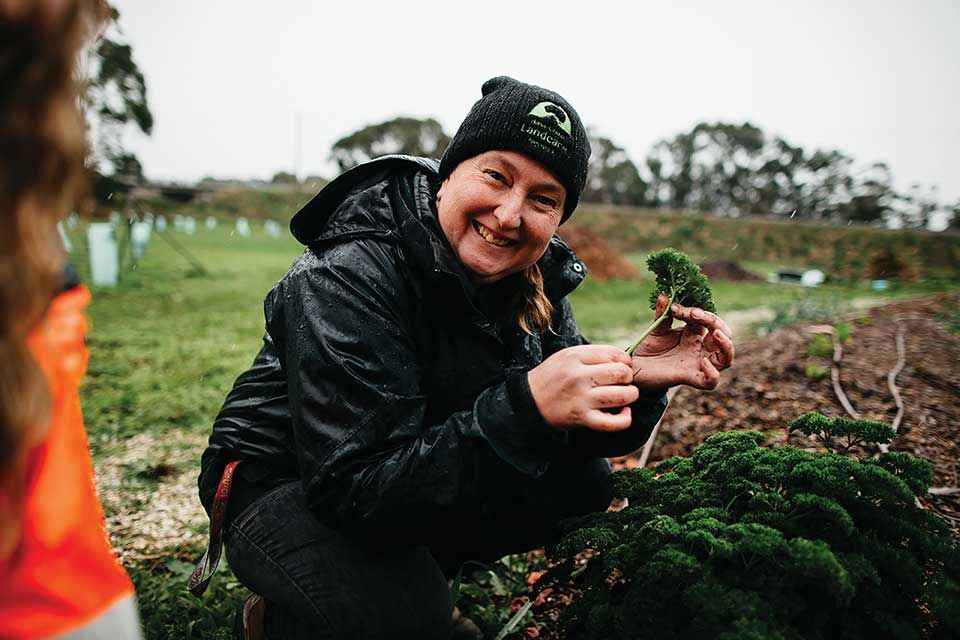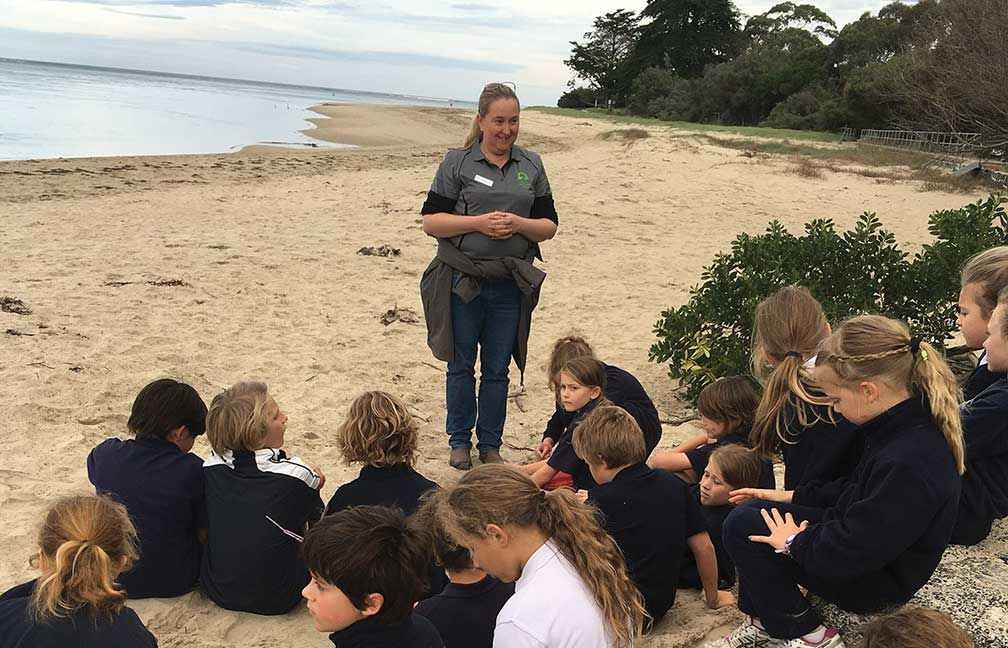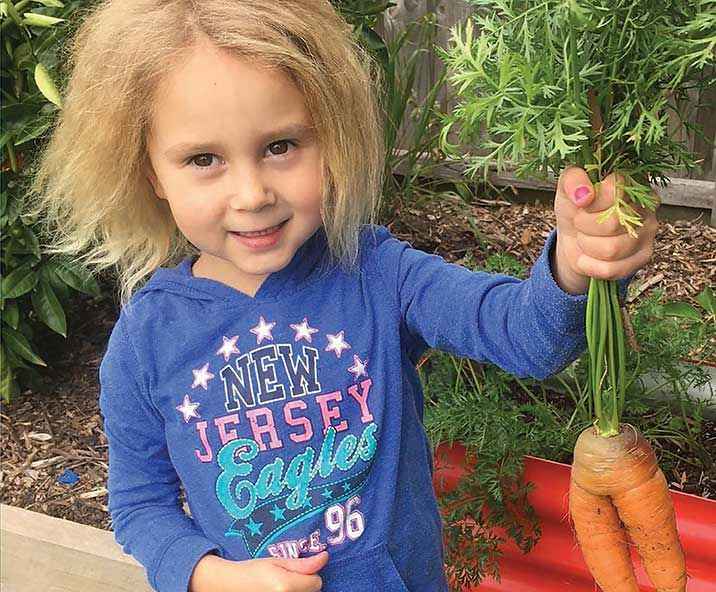Victorian Landcare Magazine - Summer 2023-24, Issue 86

When people ask me, ‘So, what do you do with yourself?’ I say that I’m a mum, I work for Landcare, and I also run a small business on the side. They say, ‘Wow you must be busy!’ and I am, but I wouldn’t trade it for anything else in the world.
I’ve had lots of different jobs before and alongside my Landcare roles over the years – as a ranger, tour guide, youth support worker, graphic designer, in hospitality and even as a lifeguard. My Landcare career began in 2003 when I took on the part-time role of Wildlife Corridor Project Officer for the Phillip Island Landcare Group. With my passion for plants and helping people lessen their impacts on the planet, I loved working on revegetation projects and the later expansion of my role into group facilitation, urban Landcare, education, and sustainability projects.
When the Bass Coast Landcare Network (BCLN) formed in 2006, Landcare group staff employment in the region began to
be managed by the network. Currently I am the Education, Training and Communications Manager at BCLN working 3.5 days per week. With a background in graphic design, overseeing BCLN communications is a great fit for me. I love using images and words to communicate complex environmental concepts and inspiring people to act. Skilful use of language can make a big difference, helping me write successful grant applications that bring in more support for our projects and programs.
I love using images and words to communicate complex environmental concepts and inspiring people to act.
A large part of my role is educating the next generation through our Environmental Detectives Program. Students are guided through engaging and fun learning experiences that create attachment to their own local landscapes, helping develop a desire to protect and conserve them into the future. I also oversee the development of our one-hectare education, small trials and community growing space called the River Garden at Bass. Here we work with schools and volunteers, including disability groups, and host lots of interesting training programs.
I am always up for a challenge and ongoing changes to my role keeps things interesting.
I have worked for Landcare both full-time and part-time over the years and have been extremely lucky to have flexible working arrangements. I set my own hours and days in agreement with my managers.
I believe this is possibly the most important benefit that Landcare employers can offer their staff, if they want to retain good people and get great, long-term performance from them.
I was working full-time when I took maternity leave to have my daughter Tayla, now eight. That was when my creative side came rushing back. I started my own business, designing and making jewellery from crystals and natural materials and selling it at summer markets. When I returned to my Landcare work, I negotiated a part-time role, so I was able to spend time with my family and keep up my jewellery business.
Flexible hours are the key to juggling my Landcare work-life balance. It means I can still do school drop-offs, and some pickups which my partner and I share.
Flexible hours are the key to juggling my Landcare work-life balance. It means I can still do school drop-offs, and some pickups which my partner and I share. We use after school care a few days a week. I try to keep my Landcare days regular, so people know when I’m around, but I’m flexible enough to attend evening meetings or run events on the weekend if needed. This allows me to take time off for other things that are important to me, including school assemblies, volunteering at school excursions, attending swimming lessons, to take time off on school holidays, or for family trips.

Above: Lisa running Environmental Detectives activities at Inverloch foreshore with local school children.
It’s important to look after yourself so you can maintain all this activity for the long term. Yoga, water aerobics, meditation and walking in nature are some of the things that keep me grounded, healthy and sane. This year I am also trying to take short breaks on the way home from work or other engagements by stopping to explore unfamiliar places and to recharge.
I find the switch between Landcare and working in my jewellery business of great mental benefit. The more reflective mental state that I find myself in while doing something like knotting a mala necklace, is sometimes when the best Landcare ideas come to me, and when I realise more creative and effective answers to any problems in my Landcare work.
No day is typical My day usually starts hunting for lost shoes and lots of mum chores before school drop off. Then it can be filled with many different and sometimes unpredictable elements. I could be taking a school group out to a local site, working with volunteers in the River Garden, or meeting with groups or stakeholders. I could be working from home or at the BCLN office at Bass on grant writing, reporting, emails, media campaigns, writing strategy documents or updates for our E-news, website, or social media; or organising events, training days or tours.

Above: Lisa Wangman’s daughter Tayla with the first carrots she planted and grew.
The school terms and seasons also impact my workload. Term two and three are busiest with our school activity bookings and tree plantings. The River Garden needs more time during rapid growth in autumn and spring. There are always important deadlines for grants and reporting. Stakeholder engagement, project management and group meetings are also year-round.
Planning is critical. I rely on what I call my ‘horrendagram’ – a self-invented spreadsheet of funding sources and projects that determines the balance of time and resources spent by myself and other staff, on the many different activities in the projects and programs I manage. I also use colour-coded lists to keep track of tasks and help our teams work together. BCLN is starting to use an online platform to assist with projects, staff, and time management too. I couldn’t do what I do without my amazing colleagues at BCLN, especially Anna Brayley and Luke Phillips. We set our quarterly goals as a team and can pull together when needed to get the jobs done.
There are weeks where I just can’t squeeze in another email or meeting. If I have deadlines for reports, grants, or media, I sometimes choose to work at night when it is quiet, but due to flexible working, I can take other times off when it suits me better. Setting some boundaries to protect your personal time is important and having a separate phone for work and home helps.
Getting the work-life balance right is an ongoing challenge for many people, including me. When you are doing something you love – for me that’s working for Landcare – where I get to see the landscape changing for the better and help people increase their skills and knowledge, you realise you are making a difference and it’s all worth it.
Lisa Wangman is Education, Training and Communications Manager at Bass Coast Landcare Network.
For more information email lisa.wangman@basscoastlandcare.org.au